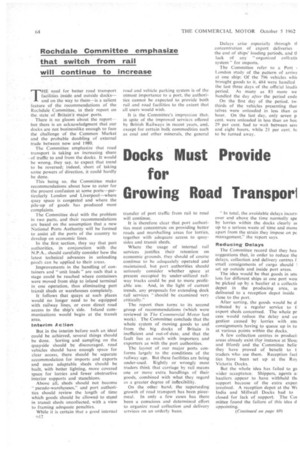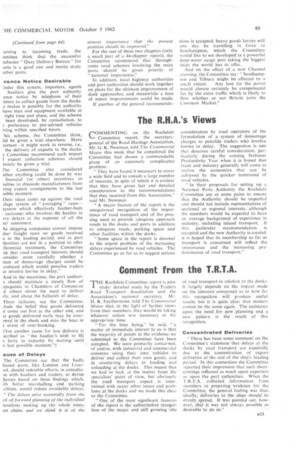Docks Must Provide for Growing Road Transpori
Page 66

Page 71

If you've noticed an error in this article please click here to report it so we can fix it.
HE need for better road transport facilities inside and outside docks . and on the way to them—is a salient feature of the recommendations of the Rochdale Committee, in their report on ther state of Britain's major ports.
There is no gloom about the report-but there is an acknowledgment that our docks are not businesslike enough to face the challenge of the Common Market and the probable doubling of external trade between now and 1980.
The Committee emphasize that road transport is taking an increasing share of traffic to and from the docks. It would be wrong, they say, to expect that trend to be reversed; indeed, short of taking some powers of direction, it could hardly be done.
This being so, the Committee make recommendations about how to cater for the present confusion at some ports—particularly London and Liverpool—where quay space is congested and where the pile-up of goods has produced most complaints.
The Committee deal with the problem in two parts, and their recommendations are based on the assumption that a new National Ports Authority will be formed to assist all the ports of the country to develop on economic lines.
In the first section, they say that port authorities, in conjunction with the N.P.A., should carefully consider how the latest technical advances in unloading goods can be applied to their areas.
Improvements in the handling of containers and "unit loads" are such that a stage could be reached where containers were moved from ship to inland terminal in one operation, thus eliminating port transit sheds or warehouses completely.
It follows that quays at such places would no longer need to be equipped with railway lines, or even direct road access to the ship's side. Inland communications would begin at the transit area.
Interim Action But in the interim before such an ideal could be achieved, several things should be done. Sorting and sampling on the quayside should be discouraged. road vehicles should have enough space for clear access, there should be separate accommodation for imports and exports and more adaptable sheds should be built, with better lighting, more covered space for lorries and fewer obstructive interior supports and stanchions. Above all, sheds should not become " pseudo-warehouses," and port authorities should review the length of time which goods should be allowed to stand in transit sheds uncollected, with a view to framing adequate penalties.
While it is certain that a good internal 2 road and vehicle parking system is of the utmost importance to a port, the authorities cannot be expected to provide both rail and road facilities to the extent that all users would wish.
It is the Committee's impression that, in spite of the improved services offered by British Railways in recent years, and, except for certain bulk commodities such as coal and other minerals, the general transfer of port traffic from rail to road will continue.
It is therefore clear that port authorities must concentrate on providing better roads and marshalling areas for lorries, together with adequate access to quaysides and transit sheds.
Where the usage of internal rail services justifies their retention on economic grounds. they should of course continue to be adequately operated and maintained, but port authorities should seriously consider whether space at present occupied by under-utilized railway tracks could be put to more profitable use. And, in the light of current trends, any proposals for extending dock rail services "should be examined very critically."
The report then turns to its second group of recommendations (which were reviewed in The Commercial Motor last week). The Committee conclude that the whole system of moving goods to and from the big docks of Britain is inefficient and out-of-date, and that the fault lies as much with importers and exporters as with the port authorities.
The layout of our major ports conforms largely to the conditions of the railway age. But these facilities are being under-used. Rightly or wrongly most traders think that carriage by rail means one or more extra handlings of their goods, combined with what they regard as a greater degree of inflexibility.
On the other hand, the superseding growth of road transport has been piecemeal. In only a few cases has there been a conscious and determined effort to organize road collection and delivery services on an orderly basis. Delays arise especially through ti concentration of export deliveries the end of ships' loading periods, and ti lack of any organized colleen! system " for imports.
The Committee refer to a Port London study of the pattern of arriva at one ship: Of the 796 vehicles whi( brought goods to it, 484 were handled the last three days of the official loadir period. As many as 83 more we handled the day after the period ende
On the first day of the period, tw thirds of the vehicles presenting ther selves were unloaded in less than or hour. On the last day, only seven p cent. were unloaded in less than an hoc 29 per cent. had to wait between sev( and eight hours, while 21 per cent. IN to he turned away.
" In total, the avoidable delays incurn over and above the time normally spe by lorries within the docks clearly at up to a serious waste of time and mone apart from the strain they impose on pc management," the report says.
Reducing Delays The Committee record that they hea suggestions that, in order to reduce the delays, collection and delivery centres f. small consignments of cargo should set up outside and inside port areas.
The idea would be that goods in sml lots for different ships at one port wou be picked up by a haulier at a caeca( depot in the producing area, at delivered to a reception depot inside . close to the port.
After sorting, the goods would be d tributed by a regular service to ti export sheds concerned. The whole pr cess would reduce the delay and co gestion caused by lorries with srrn consignments having to queue up in tu at various points within the docks.
A few collection centres in producii areas already exist (for instance at Slott; and Ilford) and the Committee belie they have proved of benefit to traders who use them. Reception faci ties have been set up at the Roy Victoria Docks.
But the whole idea has failed to ga wider acceptance. Shippers, agents al hauliers appear to have withheld th( support because of the extra expen involved. A reception depot at the Vic India and M ifiwall Docks had to closed for lack of support. The Cot mittee found the failure of this idea d appointing. urning to incoming trade, the nmittee think that the successful achester " Quay Elelivery Bureau" for orts is a good one and merits study other ports.
vance Notice Desirable Jnder this system, importers, agents hauliers give the port authority ance notice by telephone of their ;ntion to collect goods from the docks. s makes it possible for the authority have men and equipment available at right time and place, and the scheme been developed, by consultation, to preference to pre-advised vehicles tying within specified hours.
h is scheme, the Committee think, ild be given a trial elsewhere. More )ortant—it might work in reverse, i.e., the delivery of exports to the docks. : Committee recommend such import I export collection schemes should initely be given a trial.
rhe Committee also considered ether anything could he done by way financial (or other) incentives or taffies to dissuade manufacturers from ving export consignments to the last tsible moment.
['heir ideas came up against the road ilage system of " averaging " rates— system which effectively feather-beds customer who involves the haulier in wy delays at the expense of all the ter customers.
Ass shipping companies cannot impose ;her freight rates on goods received e in the loading period, and as port thorities are not in a position to offer )ferential treatment, the Committee nk that road transport interests should ;onsider most carefully whether a ;tem of demurrage charges could be roduced which would penalise traders to involve lorries in delay."
And in the meantime, the port authoris should maintain a steady flow of opaganda to Chambers of Commerce d others about the need to deliver rly, and about the fallacies of delay. These fallacies, say the Committee, :lude the belief that goods delivered tt come out first at the other end, and at goods delivered early may be overwed in the sheds and miss the boat in e event of over-booking.
(Yet another cause for late delivery is scribed as the haulier's wish to fill s lorry to capacity by waiting until e last possible moment.") ause of Delays The Committee say that the badly fected ports. like London and Liver)01, should redouble efforts, in consultam with hauliers and traders, to devise hemes based on these findings which. ith better marshalling and parking cilities, would reduee avoidable delays.
The delays arise essentially from the ck of .forward planning of the individual 7erationv making up the whore transVt chain, and we think' it is of tile
utmost importance that the present position should be improved."
For the rest of these two chapters (only a small part of a 44-chapter report), the Committee recommend that throughroute road schemes involving the main ports should be given priority of national importance."
In addition, local highway authorities and port authorities should work together on plans for the ultimate improvement of dock approaches, and meanwhile a host of minor improvements could be made.
If another of the general recommenda
tions is accepted, heavy goods lorries will one day be travelling in force to Southampton, which the Committee would like to see developed as a powerful deep-water cargo port taking the biggest ships the world has to offer.
And on the effect of a new Channel crossing, the Committee say: "Southampton and Tilbury might be affected to a small extent. Any loss (to the ports) would almost certainly be compensated for by the extra traffic which is likely to flow whether or not Britain joins the Common Market."
























































































































